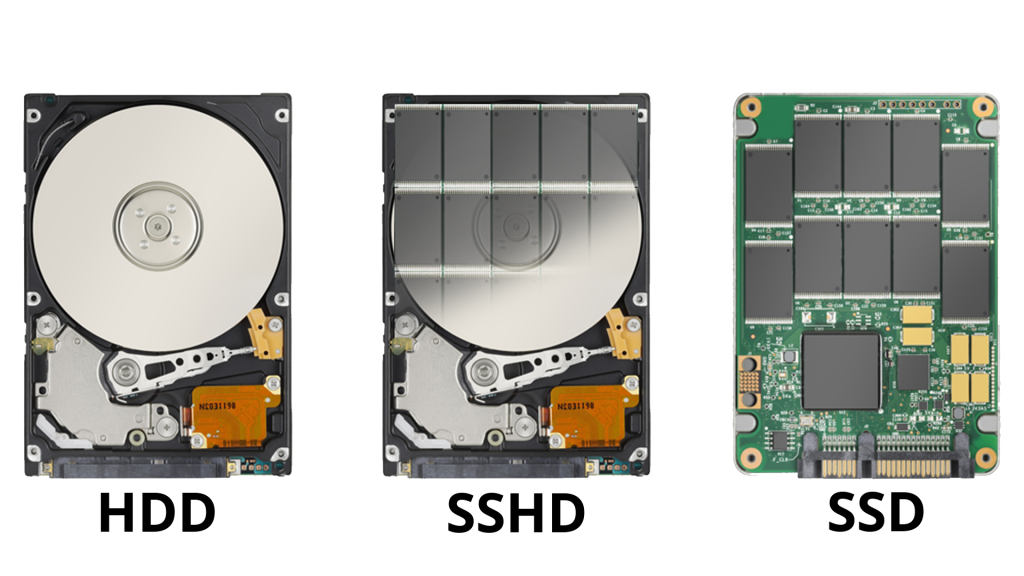SSD vs HDD vs SSHD - Which Storage Device Should You Choose For Your Laptop and PC
With the increase of data on this freaking planet on daily basis, we need storage but only storage doesn’t solve our issue. In addition to storage we need performance also. So what to do for increasing the performance of our PC/Laptop. Which storage device should we choose among SSD, HDD or SSHD.
HDD – Hard Disk Drive
Hard Disk Drives (HDD) is a vital component of the computer that stores data. It is the default data storage of most laptops and desktops that stores the operating system, all programs, data files, and installed apps. It uses magnetic storage, spinning disks, and a moving actuator arm to write, retain and fetch digital information whenever needed. HDD consists of a mechanical arm that moves to read and write the data. This means that HDD performs physical movement to retrieve any required data. HDD resides inside the computer and has spinning disks where data is stored magnetically. There’s a platter that is coated with a magnet on both sides. Due to this magnetizing mechanism, the data on HDD remains intact even power is switched off.
SSD – Solid State Drive
The Solid State Drive (SSD) stores data on non-volatile “flash” memory chips and has no moving parts. It stores all data in integrated circuits and follows the operating principle of a USB flash drive, but with a larger capacity and much faster processing. This is a relatively new storage technology mostly found in modern laptops. Unlike a traditional hard drive – an SSD has no moving parts and uses NAND flash memory. As compared to HDDs, this technology has reduced access time because users don’t need to wait for platter rotation to start up. This storage device comprises a grid of electrical cells that can quickly receive and send the data. The advanced SSDs have more NAND chips which make SSDs storage capacities close to HDDs. However, it comes with a price tag higher than consumer-grade HDDs.

SSHD - Solid State Hybrid Drive
SSHD is basically the combination of
SSD & HDD. It stands for Solid State Hybrid Drive. It has some
features from HDDs and some from SSDs. Solid State Hybrid Drive combine
a small, fast and affordable amount of NAND flash memory with a
traditional hard drive.
At this stage we are able to have a
little bit idea about the SSDs, HDDs and SSHD. Now the question is
which storage device should we choose among them? To answer this
question we will take a look at the advantages of using these storage
devices after that it will solely depends on your mindset and your
requirement that what you want; performance, storage capacity or both.
- Faster Performance
PC/Laptop with SSDs are much faster than the PC/Laptop with HDDs. SSDs equipped PC/Laptop boots quickly, faster file transfer, fast data access. HDD has higher latency, longer read/write times, and supports fewer IOPs (input output operations per second) compared to SSD. Hence here we can conclude that SSD wins over HDDs in terms of overall faster performance. Intel claims their SSD is 8 times faster than an HDD, thereby offering faster boot up times.
- Durability
An SSD has no moving parts, featured with non-mechanical design of NAND flash mounted on circuit boards, and are shock resistant up to 1500g/0.5ms, so it is more likely to keep your data safe as it is non-volatile. Hard Drives consist of various moving parts making them susceptible to shock and damage.
- Defragmentation
The HDDs need to be periodically defragmented to improve performance whereas SSDs don't need to worry about defragmentation, since there's no physical read head. Thus, SSDs are inherently faster than HDDs.
- Noise
HDDs use more electricity to rotate the platters, generating heat and noise but as SSDs has no moving parts, SSDs run silently with no noise at all.
- Weight
HDDs are heavier than SSD drives. Since SSDs do not have the rotating disks, spindle and motor hence they are lighter than the HDDs. According to ocz.com a storage device manufacturing company, Flash-based SSDs weigh considerably lesser than hard drives – only 77g vs. 752.5g for HDDs.
- Power efficiency
SSDs are more power efficient as compared to HDDs resulting in longer battery life of Laptop/Notebooks.
- Reliability
Since HDD has moving parts hence there is increase in the risk of mechanical failure. Unlike HDD drives, SSD disks do not have moving parts, so SSD reliability is higher.
- Price
It is the only attribute where HDDs wins over SSDs. SSDs are costlier than the HDDs. 1 TB external hard drive (HDD) cost for $55 on Amazon while a 1 TB SSD costs about $475. Now from this data you can have an idea of how much SSDs are costlier than the HDDs.
- Availabilty
SSDs are less available in the market, this is another area where HDDs wins little bit but nowadays it is easily available with the increase of e-commerce websites.
- Capacity
If we talk about capacity obviously HDDs offers more capacity than the SSDs while SSDs are only affordable at lower capacities. High-capacity SSDs are extremely expensive.
Which type of storage is best?
By now, you have a little idea about the SSDs, HDDs, and SSHD. Now, you may think which storage device will best suit your needs. So, let’s compare HDD, SSD, and SSHD to help you choose the right one.
For Laptops
While the choice depends mostly on preferences, laptops have rooms only for a single drive thus making it a trickier decision. You can choose hard drives if you want to store more data inexpensively. HDDs are easily available and their storage capacity is exponentially larger than solid-state drives. But because of the moving parts, there is a risk of mechanical failure and data loss. Also, HDDs are slower than other variants. SSDs, on the other hand, will provide for the highest overall performance. However if it the largest amount of storage you are searching for, you may want to choose the SSHD. Contrarily, if you wish to spend the least amount of money, you might stick with the option of a traditional hard drive.
SSD does not only have limited storage capacity but are also expensive on your pocket when compared to traditional hard drives. A traditional 1TB hard drive would cost you one-sixth of what a 1TB SSD could weigh on your pocket. On the contrary, even an SSHD makes a smart choice as it would cost you a quarter of the 1TB SSD but will offer for a balance between performance and space.
The SSHD learns which applications are most used and to accommodate faster loading times and better performance, those are stored in the Solid-state storage. An SSHD therefore may make your laptop boot faster but it still lags behind SSD in terms of the performance speed.
Moreover, you must check for a drive that would fit within the storage slot on the laptop. Hence, when ordering the drive, you must check for the dimensions. For instance, a few ultra-portable laptops require a micro SATA drive smaller than 1.8 inches.
For Desktops
When it comes to HDD, this device uses more electricity to rotate the platters. This results in producing more heat and noise. But with no moving parts, SSDs are silent and more power-efficient. Since most PCs can accommodate multiple drives, the need for SSHD is bleak. A lot of newer PC’s come with both a traditional hard drive and an SSD with the operating system installed on the smaller capacity SSD along with few essential functions and programs while the user data like music and pictures are mostly stored on the hard drive as they don’t require fast storage.
With the SSHD however, whether in a laptop or a pc, the advantage is that no special software or configuration is needed. It does not need you to decide where to store various programs or files.
Previous Blog :-Rooting | Should I Root My Android | Does Rooting Involve Any Dangers?
For More Content Join Our Telegram Or WhatsApp Group


0 Comments:
Post a Comment